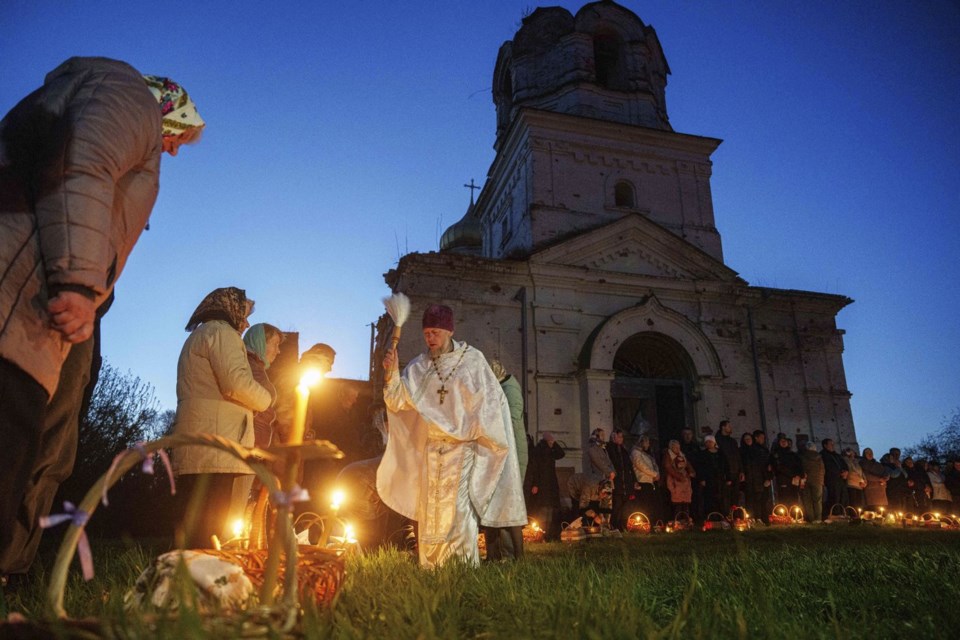LUKASHIVKA, Ukraine (AP) — Dozens of Ukrainians gathered outside the ruins of a damaged church in northern Ukraine on Sunday to mark Easter, doubting a ceasefire with Russia is possible.
Kyiv has voiced skepticism about the Easter ceasefire announced by Russian President Vladimir Putin and said that Ukrainian forces would only mirror a genuine halt in hostilities. Ukrainian President Volodymyr Zelenskyy said Saturday night that Russian strikes had continued, although with less intensity.
“Christ is risen!”
In the village of Lukashivka in the Chernihiv region, briefly occupied by Russian forces in 2022, parishioners of the damaged Ascension Church arrived early at a small makeshift wooden church built last year to cater to the needs of the faithful, holding traditional Easter baskets and cakes to have them blessed.
As the sun rose, they stood quietly in the spring chill, the roofless silhouette of the wrecked church behind them, its pale walls scarred by shell fragments.
The church’s priest, Serhii Zezul, walked among them, shouting “Christ is risen!” as he sprinkled holy water over the baskets — his voice nearly drowned out by the hum of a nearby generator.
The restoration of the original church, a 20th-century architectural landmark, would require at least hundreds of thousands of dollars, money the community doesn't have as the war rages on.
Since the start of Russia's full-scale invasion in February 2022, about 530 churches across Ukraine have been damaged or destroyed, and at least 25 clergy members have been killed, according to Ruslan Khalikov, head of the “Religion on Fire” project, which monitors Russian war crimes against religious communities.
“A destroyed church is a shattered soul of the community,” Zezul said. “When churches fall, the heart and core that unite people begin to collapse.”
Marking Easter in fear
More people than usual gathered in the damaged church's courtyard on Sunday. Some said they drove from cities to Lukashivka to mark Easter, fearing Russian forces might target large gatherings, especially after a recent string of missile strikes killed dozens of civilians.
For 26 years, 44-year-old Olha Rudeno attended church in the nearby city of Chernihiv, where she got married.
“But given the war, it’s psychologically difficult for me to go where there are large gatherings in cities,” she said.
Rudeno doesn't think a ceasefire with Russia will happen.
“Believing in a ceasefire is deceiving yourself. I don’t know how much time has to pass for me to truly believe one is possible," she said.
Doubt of a truce between Russia and Ukraine has deepened as U.S.-led efforts have so far yielded no breakthrough. Moscow has effectively rejected a separate, comprehensive ceasefire proposal, backed by President Donald Trump and endorsed by Ukraine. The Kremlin has tied any agreement to a halt in Kyiv’s troop mobilization and Western arms supplies — conditions Ukraine has refused, fearing they would allow Russia to regroup and escalate.
“My personal opinion is that there will be no ceasefire,” said Zezul. “And even if there is one, there are no details on where it would apply. On the front line, our soldiers are still fighting.”
Still, Zezul said that celebrating Easter among ruins reflects the resilience of faith during war. “Despite everything, people still gather. They believe in something better. We are being reborn, we are standing back up. Truth always triumphs over evil. People believe that, they hope for that.”
In his Easter message, Zelenskyy reflected on suffering and the struggle to hold on to faith. “Each of us has lived through such moments ... and you ask: ‘God, why is this happening to us?’”
He also mentioned the deadly missile strike on Sumy during Palm Sunday, and the bombardments of Kryvyi Rih, Kharkiv, Dnipro, Odesa, and other cities, saying people tend to turn inward when they can't make sense of things.
"Something invisible yet powerful within us doesn’t let us give up. It shows us where to find the light, so we don’t lose our way.”
___
Follow AP’s coverage of the war in Ukraine at https://apnews.com/hub/russia-ukraine
Hanna Arhirova, The Associated Press



